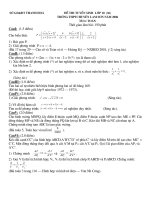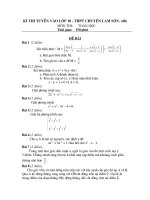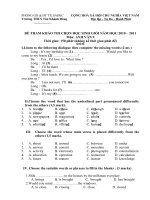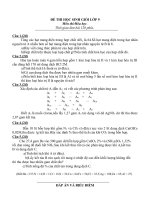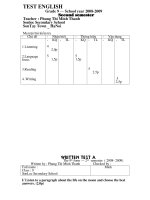100 đề luyện thi HSG tiếng anh 9 có đáp án đề 89
Bạn đang xem bản rút gọn của tài liệu. Xem và tải ngay bản đầy đủ của tài liệu tại đây (67.56 KB, 6 trang )
ENGLISH PRACTICE 45
SECTION I: PHONETIC.
Part 1: Choose the word that has the different stress from the other:
1.
A. calculator
2.
A. challenge
3.
A. astonished
4.
A. advertiser
adventurous
5.
A. alternative
B. language
B. counter
B. obstacle
B. history
C. comprehend
C. guardian
C. disposal
C. difficulty
B. impetus
C. ancestry
D. institute
D. explain
D. apparent
D.
D. dividend
Part 2: Find the word that has its underlined part pronounced differently from the rest.
6.
7.
8.
9.
10.
A.
A.
A.
A.
A.
rose
booked
weigh
blown
tidal
B. whose
B. canned
B. height
B. fown
B. final
C. disclose
C. begged
C. eight
C. grown
C. idiot
D. chosen
D. buttoned
D. vein
D. frown
D. height
SECTION II : GRAMMAR
Part 1 : Choose the word or phrase ( A, B, C or D ) which best completes each sentence.
11. The doctor examined me and then wrote out a . . . . . . . .. for me to take to the chemist.
A. paper
B. recipe
C. prescription
D. ticket.
12. I was really embarrassed in the supermarket yesterday . I got to the ……………….. and
realized I had left my money at home .
A. check - up
B. check -out
C. check -off
D. check
-in
13. Don't be late for the interview, . . . . . . . people will think you are a disorganized person.
A. unless
B. or so
C. if not
D. otherwise
14. Unfortunately, the company closed down because it couldn't keep . . . . . with rapidly
changing technologies.
A. speed
B. time
C. fast
D. pace
15. Mary 's father approved of . . . . . . in the United States for another year in order to work
toward her MA.
A. her to stay
B. her staying
C. she staying
D. she to stay.
16. There 's no need to be nervous . You 're quite capable . . . . . . . . . . your driving test.
A. of passing
B. passing
C. to pass
D. pass
17. I agree with most of what you said , but I can't . . . . . .your idea of letting children leave
school at 14.
A. keep up with
B. catch up with
C. put up with
D. go along with
18. I think that you had better . . . . . . . . . earlier so that you can get to class on time.
A. to start to get up
B. started getting up
C. start getting up
D. to get up
19. It is better to try to work…………………rather than against Nature.
A. for
B. with
C. by
D. along
20. ……………………he was good at physics in lower grades, he was terrible at it in grade12.
A. when
B. while
C. except that
D. despite
21. They want us to pay ………………………cheque.
A. for
B. in
C. on
D. by
22. Andrew came to the meeting…………………….he hadn’t been invited.
A. although
B. despite
C. in case
D. even
23. “…………………………do you go to the movies?” -”Once a month”.
A. how far
B. what time
C. how often
D. how much
time
24. PO box stands ………………………….”Post Office” box.
A. as
B. like
C. by
D. for
25. Unless we ………………….up to these problems, many species of animals will become
extinct.
A. look
B. turn
C. face
D. get
26. We all know that the English ………………….strong traditions.
A. have much
B. has much
C. has many
D. have many
27. Daisy’s marriage has been arranged by her family. She is marrying a man
……………………….
A. she hardly knows him B. whom she hardly know
C. she hardly knows
D. that she hardly know
28. All the athletes taking part in the international games should be proud of ……………………
A. oneself
B. themselves
C. yourself
D. himself
29. If I could speak Spanish, I ……………………..next year studying in Mexico.
A. will spend
B. had spent
C. would spend
D. would have
spent
30. The old man serves the ball so skillfully. He ……………..a good tennis player when he was
young.
A. can be
B. must be
C. could be
D. must have been
31. We haven't gone to a movie for years.
a). We go to a movie every day.
b). We haven't gone to a movie yet this year, but last year we did.
c). We haven't seen a movie for long time.
d). We don't go to a movie unless we have the time.
32. Fewer people came to the meeting than we had expected.
a). Too many people came to the meeting.
b). There were more people at the meeting than we had expected.
c). There were not enough seats for all people as we had expected.
d). We had expected more people to come to the meeting.
33. " What were you doing last night, Mr John?" the police asked.
a). The police asked Mr. John what he had been doing the night before.
b). The police asked Mr. John what were you doing last night.
c). The police asked Mr. John what you were doing the night before.
d). The police asked what had he been doing the night before, Mr John.
34. My mother had the house decorated.
a). My mother had to decorate the house.
b). My mother has just decorated the house.
c). My mother had someone decorate the house.
d). The house is going to be decorated by my mother.
35. I do apologize for my forgetting your birthday.
a). I did not forget your birthday.
b). I am really sorry I forgot your birthday.
c). I am not sorry at all because I remember your birthday.
d). I never apologize for my forgetting birthdays.
36. They couldn't climb up the mountain because of the storm.
a). The storm made them not to climb up the mountain.
b). The storm prevented them from climbing up the mountain.
c). The storm made them could not climb up the mountain.
d). The storm prevent them to climb up the mountain.
37. " I don't know anything about Jack London's life and works." means ...............
a). I don't have knowledge of Jack London's life and works.
b). I have no knowledge of Jack London's life and works.
c). I know nothing about Jack London's life and works.
d). All are correct
38. It was such a sunny day that none of us wanted to do any work.
a). None of us felt like doing any work because it was such a sunny day.
b). We wouldn't do any work if it was such a sunny day.
c). None of us refused to do our work although it was a sunny day.
d). We didn't work when it was sunny.
39. "It was thought that the building had been destroyed." means...........
a). The building was thought had been destroyed.
b). The building thought to be destroyed.
c). They have destroyed the building.
d). The building was thought to have been destroyed.
40. George asked Mary ....................." Hamlet".
a). If had she seen
b). If she had seen
c). What she had seen
d). Had she seen
Part 2: From the four underlined words or phrases, identify the one that is not correct
41. Tom said that if he had to do another homework tonight, he would not be able to attend
the concert.
A
B
C
D
42. The children were playing last night outdoors when it began to rain very hard
A
B
C
D
43. After George had returned to his house, he was reading a book.
A
B
C
D
44. Ton has not finished the assignment yet, and Maria hasn’t neither.
A
B
C
D
45. I’m afraid Peter is on the phone. Do you want to come in and waiting?
A
B
C
D
46. It spent a long time to travel to the skiing resort but in the end we got there.
A
B
C
D
47. She asked why did John look so embarrassed when he saw Carole.
A
B
C
D
SECTION III: READING
Part 1 : Read the text and decide which word or phrase A, B, C or D below best fits each
space . Circle the letter you choose for each question . Number (0) has been done as an
example : ( B ). for
When you are looking ( 0 ) . . .B . . . a job, it 's important to remember a few main
points that will make it easier for you to find ( 1). . . . . . . . . . First of all , take care with your
( 2). . . . . . . . . .form and CV, as most candidates are rejected on these alone. Keep your CV
clear and simple, and make the ( 3). . . . . . . .. . of your good points.
If you are lucky enough to get invited to an ( 4). . . . . . . . ,make sure you are well prepared.
Find out as much as you can about the company, and prepare ( 5). . . . . . a set of questions
and a list of points you want to make about yourself. On the day itself, get there in plenty
( 6). . . . . . . .there is nothing worse than a candidate who (7). . . . . .. . up late . Wear fairly
formal (8 ). . . . . . . . .and make sure you look clean and presentable.
The first minute is vital. This is when most of the decisions are made , so you must try to
( 9 ) . . . . . . . . . a good impression . ( 10 ). . . . . . . ..the people who you have come to meet
and make a note of their names. Try to appear ( 11). . .. . . . ..and relaxed. Body language and
gestures require special ( 12 ) . . . . . , and keep eye contact with whoever you are talking to .
If they ask about your previous employers, be positive ( 13). . . . . . . them and about your
successes, remember to ( 14). . . . . . the truth and try to back up what you say with examples.
Avoid taking notes, and do not smoke or eat and don't ( 15 ) . . . . . . . your jacket or tie off .
Finally, when you say goodbye, remember to call people by their names.
0. A. after
B. for
C. up to
D. over
48. A. job
B. place
C. position
D. work
49. A. invitation
50. A. most
51. A. interview
52. A. each
53. A. on time
54. A. comes
55. A. clothes
uniforms
56. A. create
57. A. Speak
Salute
58. A. smug
59. A. care
concern
60. A. of
61. A. say
62. A. bring
B. selection
B. greatest
B. audience
B. all
B. in time
B. arrives
B. dresses
B. compose
B. Greet
B. arrogant
B. need
B. from
B. tell
B. lift
C. application
C. highest
C. attendance
C. every
C. of time
C. reaches
C. suits
D. illustration
D. biggest
D. appearance
D. both
D. before time
D. turns
D.
C. develop
C. Welcome
D. achieve
C. superior
C. importance
D. confident
C. about
C. talk
C. raise
D.
D.
D. around
D. discuss
D. take
Part 2 : Read the text and circle the best answer to each of the questions that follow :
We stood in Syntagma about nine o'clock in the heat of an August evening preparing to
start the business of going round the small hotels to look for a room. We had a map and I
knew the alphabet from my schooldays and from various problems in algebra and geometry,
which use many of the letters , especially the one that helps you with the area of circles.
In the bus , as Europe passed the windows of the great six -wheeler and on the ferry I 'd tried
to learn the numbers and a few of the most useful phrases . At least we would be able to
understand the price of things and exchange the normal polite greetings .We would realize
later how much English was spoken , particularly in matters of buying and selling.
With pages photocopied from a "Rough Guide to Athens" we set off. Soon it was obvious
Athens was full of English speakers using the " Rough Guide ".At one reception desk after
another people were "Sorry but... perhaps tomorrow ".Finally we got to the bottom of yet
another long street running down from Syntagma and went through the doorway of yet
another hotel to begin our ritual "Eh- heh- teh thomah-te- oh? "Have you a room ? "
A large man sat behind a desk . It was after eleven o'clock at night and we waited for
the now familiar apology and suggestion that we come back tomorrow . "Well now ",he said in
faultness English, " If you don't mind waiting till the staff clean and prepare it , there 'll be a
room ready in about an hour "After resting our tired legs and feet in the hotel 's small bar, the
large man appeared, picked up our bags and led us to a lift.
" It 's on the top foor , " he said : " On the roof ". He saw our look ."Don't worry, it 's
very comfortable. "We ascended, stepped out , followed him up a fight of stairs and through a
doorway into the open . The night sky was all around us full of very bright stars. He stopped at
a door , opened it and put our bags on the foor. We followed him . It was to be our home for
the next three weeks . He handed us the key.
" Come outside . I 'd like you to see something", he said and walked to the end of the
roof. " Just look round there ". We leaned out over the parapet just enough to be safe and put
our heads round the corner of the building . In the distance on the top of its hill, fully lit and
clearly outlined against the night sky, was the Acropolis. Later, one memorable night, we
would walk round it by moonlight, but I don't think anything could ever equal the magic of first
seeing it the way we did, just a little before midnight from the top of a Athens roof.
63. What was the writer looking for ?
A. small room B. somewhere to stay
64.What does he say about Greek ?
A. He had learned it at school
C. He was able to read it
65. What does he say about English ?
A. Everybody spoke it
C. a business hotel
D. a room for a friend
B. His maths teacher taught it
D.A school friend taught him
B. Most shopkeepers spoke it
C. Shopkeepers were very fuent
D. Business people used it.
66. What did they learn about the " Rough Guide ? "
A. It was well- known in Athens
B. Many English speakers had photocopies.
B. English users had copies of it.
D. Many English tourists used it.
67 When they entered the last hotel
A. they felt it was a waste of time
B. they kept an open mind
C. they hoped for a room next day
D. they could hardly stand.
68. How did they feel when they heard the room was on the roof ?
A. They thought it was too high up
B. They thought it was unsuitable
C. They didn't want to climb stairs
D. They thought it was too open.
69. Why did he asked them to come outside ?
A. He wanted to warn them about the roof
B. He was annoyed with them
C. He wanted them to stay 3 weeks
D. He wanted to surprise them.
70. What was their reaction to the view ?
A. They were surprised
B. They preferred it by moonlight
C. They were delighted
D. They felt unsafe watching it.
Part 3 : Read the text below. Use the word given in capitals at the end of each line to form
a word that fits in the space in the same line. Number ( 0 ) is an example for you :
The most ( 0 ) effective way of learning a language is by living in the
EFFECT
country concerned, but parents should think ( 1).. . . . . . . . . before they
CARE
send their children abroad. Although some ( 2). . . . . . . . . arrange visits
ORGANISE
for children as young as ten, the ( 3 ). . . . . . . . . . . of them won't be ready
MAJOR
to stay away from home and deal with ( 4 ). . . . . . . . . . differences until they
CULTURE
are in their teens . Even then they will need a basic ( 5). . . . . . . . . . . . ..
KNOW
of the language and some experience of foreign travel before they go.
Exchange visits are a good way for ( 6). . . . . . . . . . to improve
their language skills. It is a good idea for them to exchange ( 7 ). . . . . .
before the visits. Host families should not feel any ( 8 ). . . . . . . . . .
to provide an extensive programme of ( 9 ). . . . . . It is more important
ENTERTAIN
to make the guest feel welcome . Travel can ( 10 ). . . . . . the mind , and
exchange visits give young people experience of a different way of life
as well as a different language.
71. A. careful
B. carefulness
C. carefully
72. A. organised
B. organiser
C. organisers
73. A. majors
B. majority
C. major
74. A. culture
B. culturally
C. cultures
75. A. knowledge B. know
C. knowledgeable
76. A. teen
B. teens
C. teenagers
77. A. correspond B. correspondence
C. correspondent
78. A. obliged
B. obligement
C. obliger
79. A. entertainment
B. entertain
C. entertainer
entertained
80. A. broadly
B. broadened
C. broaden
broadness
THE END
KEYS
II/ Phần Ngữ pháp - Từ vựng - Đọc hiểu ( 12,0 pts )
Câu 1 : Phần chọn từ, cụm từ đúng A, B,C hoặc D ( 2,0 pts )
TEENS
CORRESPOND
OBLIGE
BROAD
D. careless
D. organizes
D. majorities
D. cultural
D. unknown
D. teenager
D. correspondently
D. oblige
D.
D.
1. C ( prescription )
2. B( check -out )
3. D ( otherwise )
4. D ( pace )
5. B ( her staying )
6. A ( of passing )
7. D (go along with )
8. C ( start getting up )
Caâu 2 : Phần chọn từ đúng A, B, C hoặc D trong baøi text ( 1,5 pt )
1. D ( work )
2. C ( application )
3. A ( most )
4. A ( interview )
5. D ( both )
6. C ( of time )
7. D ( turns )
8. A ( clothes )
9. A ( create )
10. B ( Greet )
11. D ( confident )
12. A ( care )
13. C ( about )
14. B ( tell )
15. D ( take ).
Câu 3 : Phần bài đọc hiểu ( 2,0 pts )
1. B ( Somewhere to stay )
2. C ( He was able to read it )
3. D ( Business people used it )
4. C ( English users had copies of it )
5. A ( They felt it was a waste of time )
6. B ( They thought it was unsuitable )
7. D ( He wanted to surprise them )
8. C ( They were delighted )
III/ Phaàn Writing ( 5,0 pts )
Phaàn 1 : Phaàn biến đổi câu theo cấu trúc ngữ pháp gợi ý ( 2,0 pts )
1. A new sports center was opened by the president last week.
2. Unless you are a student, you can't always get special reduced prices.
3. Some travel agents offer / sell / have cheaper tickets / make cheaper tickets available.
4. Don't leave the / your car keys with you when you park/ Don't forget to take the / your car
keys with you when you park.
5. There has been no appreciable expansion of the population of the UK in the last decade.
6. Mrs Hype apologized for having arrived too late for the meeting.
7. No sooner had exam results been put up than all the students rushed to the notice board.
8. Despite his old age/ being very old, he still walks round the park everyday.
Phần 2 : Phần bài luận ( 3, 0 pts )
- Chấm điểm phần ngữ pháp , cấu trúc câu , cách dùng từ ngữ , cách giới
thiệu, cách chuyển ý .
+ Nếu học sinh nêu được 3 hoặc 4 ý trở lên :
- Về những thuận lợi và khó khăn của cuộc sống thành thị được : 1.5 điểm
- Về những thuận lợi và khó khăn của cuộc sống nông thôn được : 1.5 điểm .
